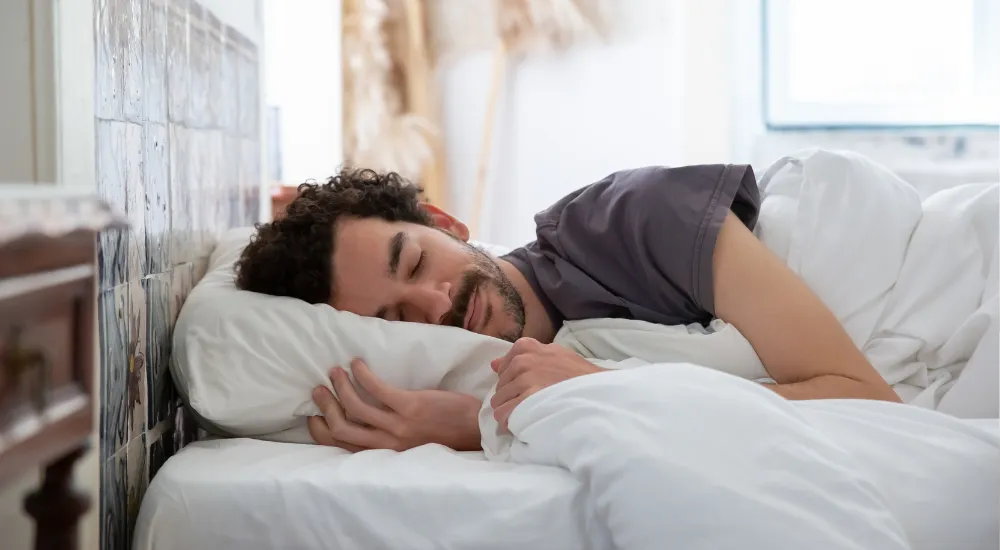Article
Home / Trending / Sleep
Getting More Sleep for Improved Health: Natural Approaches and Supplements
Improving Sleep Naturally: A Guide to Herbs, Vitamins, and Lifestyle Tips for Better Health

By: Admin, Oct 19 · 3 minute read

Sleep is one of the most critical components of overall health, yet many people struggle to get the recommended seven to nine hours per night. Chronic sleep deprivation can lead to a host of health problems, including weakened immunity, weight gain, mood disorders, and an increased risk of chronic diseases like heart disease and diabetes. Fortunately, there are several natural approaches and supplements, including herbs, vitamins, and minerals, that can support better sleep. This article explores some of these options and the science behind their effectiveness.
The Importance of Sleep
Adequate sleep is essential for both physical and mental health. During sleep, the body undergoes various processes that repair tissues, consolidate memories, and regulate hormones. A lack of sleep disrupts these processes, leading to cognitive impairments, mood swings, and a weakened immune system. Long-term sleep deprivation is also linked to an increased risk of chronic conditions such as obesity, diabetes, cardiovascular disease, and even certain types of cancer.
Herbs for Better Sleep
Several herbs have been traditionally used to promote relaxation and improve sleep quality. These herbs are known for their calming effects on the nervous system and ability to reduce stress, making it easier to fall and stay asleep.
1. Valerian Root: Valerian root has been used for centuries as a natural remedy for insomnia and anxiety. Studies suggest that valerian root may increase the levels of gamma-aminobutyric acid (GABA) in the brain, a neurotransmitter that promotes relaxation and reduces anxiety. A systematic review published in the American Journal of Medicine found that valerian root could improve sleep quality and reduce the time it takes to fall asleep.
2. Chamomile: Chamomile is a popular herbal remedy known for its calming effects. It contains an antioxidant called apigenin, which binds to specific receptors in the brain that decrease anxiety and promote sleep. A study published in Phytomedicine reported that chamomile extract significantly improved sleep quality in participants with insomnia.
3. Lavender: Lavender is often used in aromatherapy for its relaxing properties. Inhaling lavender essential oil has been shown to reduce heart rate and blood pressure, creating a state of calm conducive to sleep. Research published in Evidence-Based Complementary and Alternative Medicine found that lavender aromatherapy improved sleep quality in individuals with mild insomnia.
Vitamins and Minerals for Sleep
In addition to herbs, certain vitamins and minerals play a crucial role in sleep regulation. A deficiency in these nutrients can contribute to sleep problems, so ensuring adequate intake is essential for good sleep hygiene.
1. Magnesium: Magnesium is a mineral that supports many functions in the body, including muscle relaxation and nerve function. It also helps regulate the production of melatonin, the hormone responsible for controlling sleep-wake cycles. A study published in the Journal of Research in Medical Sciences showed that magnesium supplementation improved sleep quality in elderly adults with insomnia.
2. Vitamin D: Vitamin D is known for its role in bone health, but it also influences sleep. Research suggests that vitamin D receptors in the brain may regulate sleep, and low levels of this vitamin are associated with sleep disorders. A study published in the Journal of Clinical Sleep Medicine found that vitamin D supplementation improved sleep duration and quality in individuals with sleep disorders .
3. Melatonin: Melatonin is a hormone naturally produced by the pineal gland in the brain, and it plays a key role in regulating the sleep-wake cycle. While not a vitamin or mineral, melatonin supplements are widely used to treat sleep disorders, particularly in cases of insomnia or jet lag. A review in the PLOS One journal confirmed that melatonin supplementation is effective in reducing the time it takes to fall asleep and improving overall sleep quality .
Lifestyle Tips for Better Sleep
In addition to these natural supplements, adopting healthy sleep habits is crucial for improving sleep quality. Here are some tips:
- Maintain a Regular Sleep Schedule: Going to bed and waking up at the same time every day helps regulate your body's internal clock, making it easier to fall asleep and wake up naturally.
- Create a Relaxing Bedtime Routine: Engage in calming activities before bed, such as reading, meditation, or taking a warm bath. This signals to your body that it’s time to wind down.
- Limit Exposure to Blue Light: Exposure to blue light from screens can interfere with melatonin production. Consider reducing screen time an hour before bed or using blue light filters.
- Avoid Stimulants: Reduce your intake of caffeine and nicotine, especially in the afternoon and evening, as these can interfere with your ability to fall asleep.

Conclusion
Getting enough sleep is vital for maintaining overall health and well-being. Incorporating natural herbs, vitamins, and minerals, along with adopting healthy sleep habits, can significantly improve sleep quality and duration. While these natural remedies can be effective, it's always a good idea to consult with a healthcare professional before starting any new supplement regimen, especially if you have existing health conditions or are taking medications.
References
1. Bent, S., Padula, A., Moore, D., Patterson, M., & Mehling, W. (2006). Valerian for sleep: A systematic review and meta-analysis. American Journal of Medicine, 119(12), 1005-1012.
2. Zick, S. M., Wright, B. D., & Gillespie, B. (2011). The effect of chamomile tea on sleep quality among postpartum women: A randomized controlled trial. Phytomedicine, 18(9), 731-736.
3. Chien, L. W., Cheng, S. L., & Liu, C. F. (2012). The effect of lavender aromatherapy on autonomic nervous system in midlife women with insomnia. Evidence-Based Complementary and Alternative Medicine, 2012, 740813.
4. Abbasi, B., Kimiagar, M., Sadeghniiat-Haghighi, K., Shirazi, M. M., & Hedayati, M. (2012). The effect of magnesium supplementation on primary insomnia in elderly: A double-blind placebo-controlled clinical trial. Journal of Research in Medical Sciences, 17(12), 1161-1169.
5. McCarty, D. E., Chesson, A. L., Jr., Jain, S. K., & Marino, A. A. (2012). The link between vitamin D metabolism and sleep: A systematic review. Journal of Clinical Sleep Medicine, 8(6), 693-700.
6. Ferracioli-Oda, E., Qawasmi, A., & Bloch, M. H. (2013). Meta-analysis: Melatonin for the treatment of primary sleep disorders. PLOS One, 8(5), e63773.